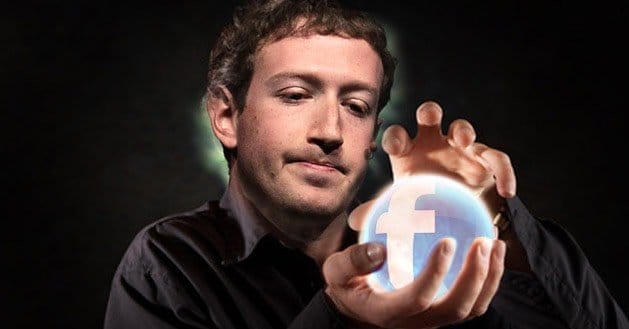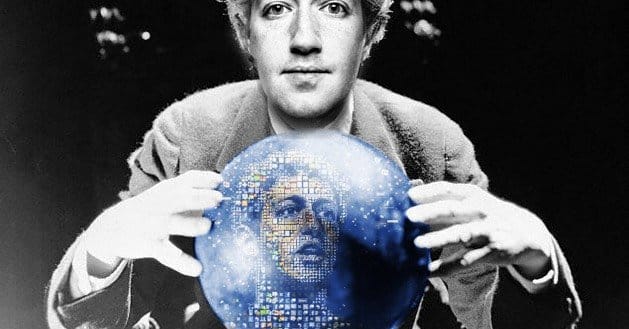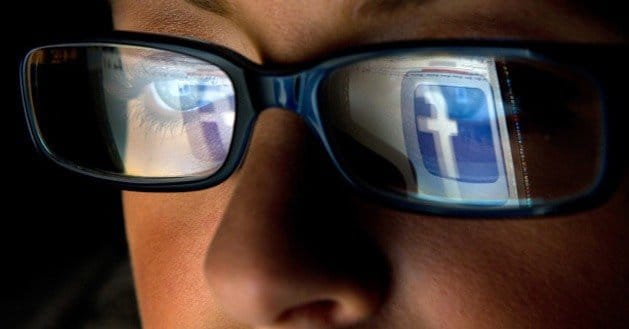 Written by ContentPowered.com
Written by ContentPowered.com
Elements of the past and present are the building blocks of the future. To predict what the future Facebook will look like, we must remember its beginning. As technology grows more sophisticated, its seeds will play a part in Facebook’s future. Facebook began as a method for Harvard students to get to know each other and share information. Within a year, it had grown to include more colleges. Eventually high schools joined Facebook and then the general public was invited to join.
Cell phone technology advanced at the same time Facebook did, so the phenomenon exploded world-wide. Now smartphones have amazing capabilities, including sharing experiences, places and things in real time. This is an important feature of the future Facebook.
In the Beginning
Since Facebook began as a method of getting to know people, businesses soon found their way onto Facebook pages. How better to be noticed than to have customers or clients mention a business on their Facebook page? The more followers a business has, the more customers or clients the business gets from followers’ friends. When cell phones became smart, those on buses, trains and those waiting at counters for something shared their experiences on Facebook.
The medium became a way to let someone know there had been a wreck on the highway, people were driving into a storm front or there was a major sale in a store along their route. Other people quickly “liked” weather pages and business pages and passed it along to their friends. Everyone was getting to know everyone else.
What did this mean for Facebook? Founder Mark Zuckerberg discovered he had a fast moving train and needed a way to track its destination. Were people with Facebook pages sharing only experiences? No. They were sharing news, weather, sports information, popular culture stories, goofy stuff from YouTube, social commentary from YouTube and tutorials of all sorts. Once Zuckerberg knew what was being shared, he needed to know why. Business models need this information, so a business can project future earnings based on solid information. Polls are one popular method of getting this data. Facebook is a master at polling and integrating the information into future innovations.
Planning the Future
The introduction of the timeline gave Zuckerberg the “when” and “why” for Facebook’s future. He had tracked what demographic was sharing what information. Now he could insert banner ads, suggest pages for people to follow and suggest people with which one could become friends. Businesses, causes and other professional persons could then get onto everyone’s page with “like” buttons and commentary. Lists of “people you should know” or “do you know these people” appeared on everyone’s timeline. This was another way to track with which people associated. It widened page holders’ circles of influence.
The next aspect of the future Facebook Zuckerberg needed to secure was how its page holders lived their lives. If they worked, he needed to know where. If they boated for pleasure, he needed to know the boat’s type and where it was moored. People have to eat. Zuckerberg needed to know their favorite foods and where they ate it. Not everyone owns a car, but Zuckerberg needed to know if people drove one and its make and model. He had the when and why of his future business model, but now he needed the how. The introduction of the social graph provided the answer. In actuality, it’s not a graph recognizable to many people from math class. A spider web would be a better example, one linking Facebook page holders with people, places and things. If a page holder drove an SUV, then it followed that they might need a trailer hitch to pull an ATV or a boat. The page holder would tap on a banner ad for a trailer hitch, providing another link in the spider web for Zuckerberg’s social graph.
Real Time
Then the smartphone came into its own. Owners of smartphones used GPS to find an address or track someone borrowing their car. Smartphone owners could join a business meeting and share presentations from anywhere on the globe. Social networks like Foursquare, GetGlue and MeetUp use GPS to place their customers and clients. These folks then share on Facebook the specials of the day, whom they saw or if traffic was a beast to get through. Facebook was now on smartphones. It could go anywhere and reach out to millions. Those millions would then check out the business their friends had patronized.
Using all the innovations introduced into Facebook and adding in those occurring in technology, Zuckerberg found himself with a ton of information. The only thing to do with it was to project it into the future. The future once brought to us by Captain Kirk and the Jedi knights was about to become a reality. The virtual world was the new frontier. The populace knew what virtual meant, thanks to the holodeck on the Enterprise, but what would it mean for Facebook?
The Future is Here
Facebook page holders have been annoyed by the “real name” rules on Facebook. Some have had pages deleted because they didn’t provide a real name, but used an alias or a shortening of their name. Their privacy settings were arbitrarily manipulated so Facebook could track them better. The GPS on their phones told Facebook where they were. People’s entries told everyone why they were there. Further clearing the tracking waters was the capability of signing in to websites using Facebook. No one thought anything of it. It was convenient. Folks already knew someone selling a car or someone selling clothes and shoes through Facebook. Future Facebook page holders could do their shopping, maybe perform a task for their job or arrange their travel through Facebook. Since page holders are tracked in real time, guess what? They already live in the virtual Facebook world.
From the user’s side of the screen, the future Facebook could prove quite interesting. Let’s say a page holder wanted to hike in the Virginia mountains this weekend. Facebook’s information could match up the hiker with those interested in such things for a get-together. Perhaps a page holder’s car has broken down and she is on the side of the road in Nebraska. She could get on Facebook, state the problem and be rescued in a matter of minutes. A more serious scenario could also happen: a guy is asthmatic and he has run out of his inhaler medicine. His wife has the car, so he can’t get to the Bangor, Maine drug store he uses to refill his prescription. First, he calls the drug store. His second move is to get on Facebook. Within minutes, someone is at his door to take him to the drug store. From the silly to the serious, this virtual thing might work.
If the privacy issue annoys people, they should take a look at what Zuckerberg has accomplished. In ten years, the man has connected billions of people world-wide. He has brought news, politics, social commentary and whimsy to those who might not have otherwise known it. He has made us all a virtual family.


I for one don’t think Facebook is going anywhere anytime soon!
Another billion dollars, probably. Facebook is too tightly integrated into everything to disappear. That’s what MySpace did wrong.
With so much information within Facebook open graph, its’ potential is huge for advertisers and businesses.